Exclusive 3:16 Interview with Georg Wilhelm Friedrich Hegel
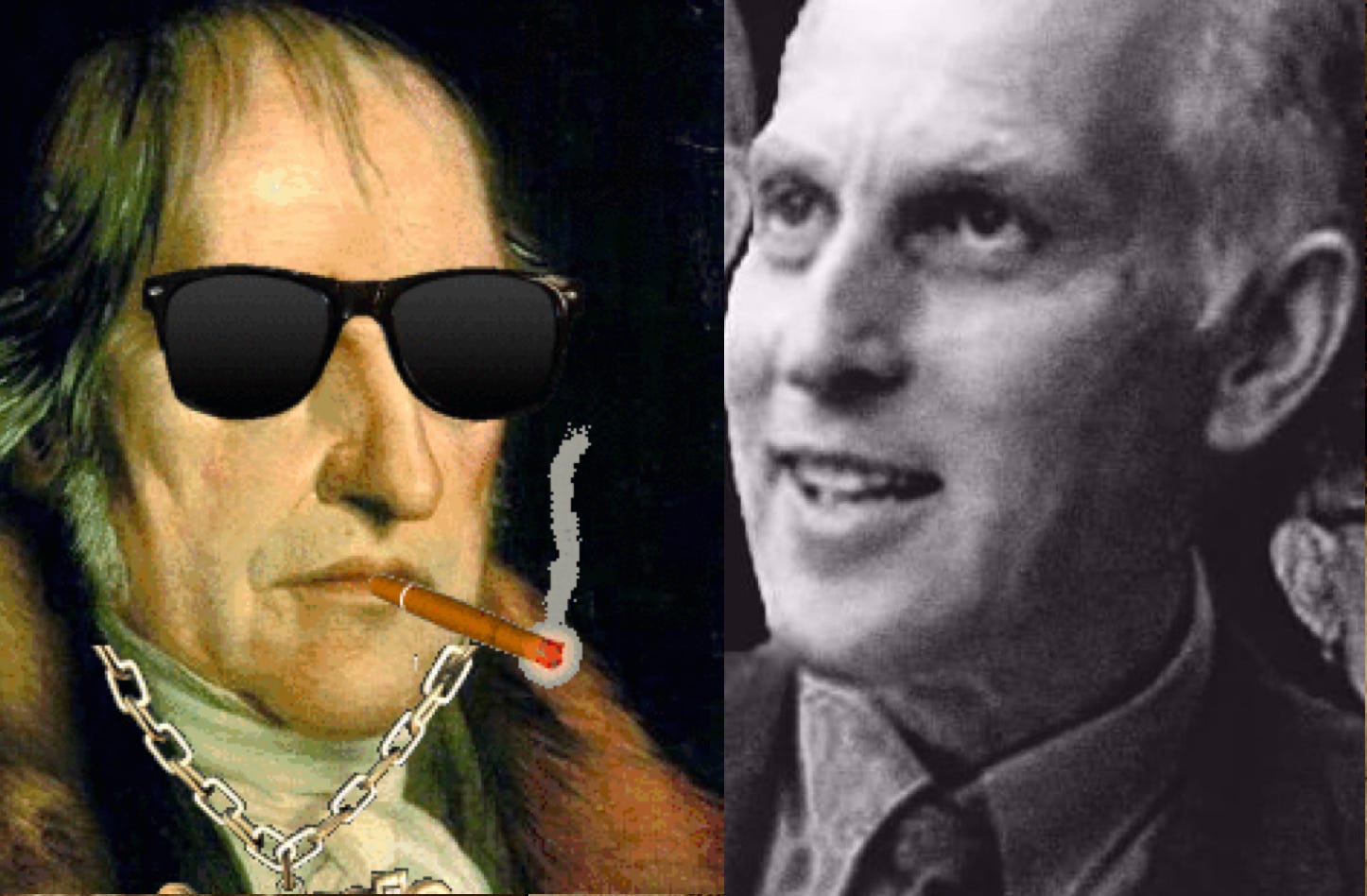
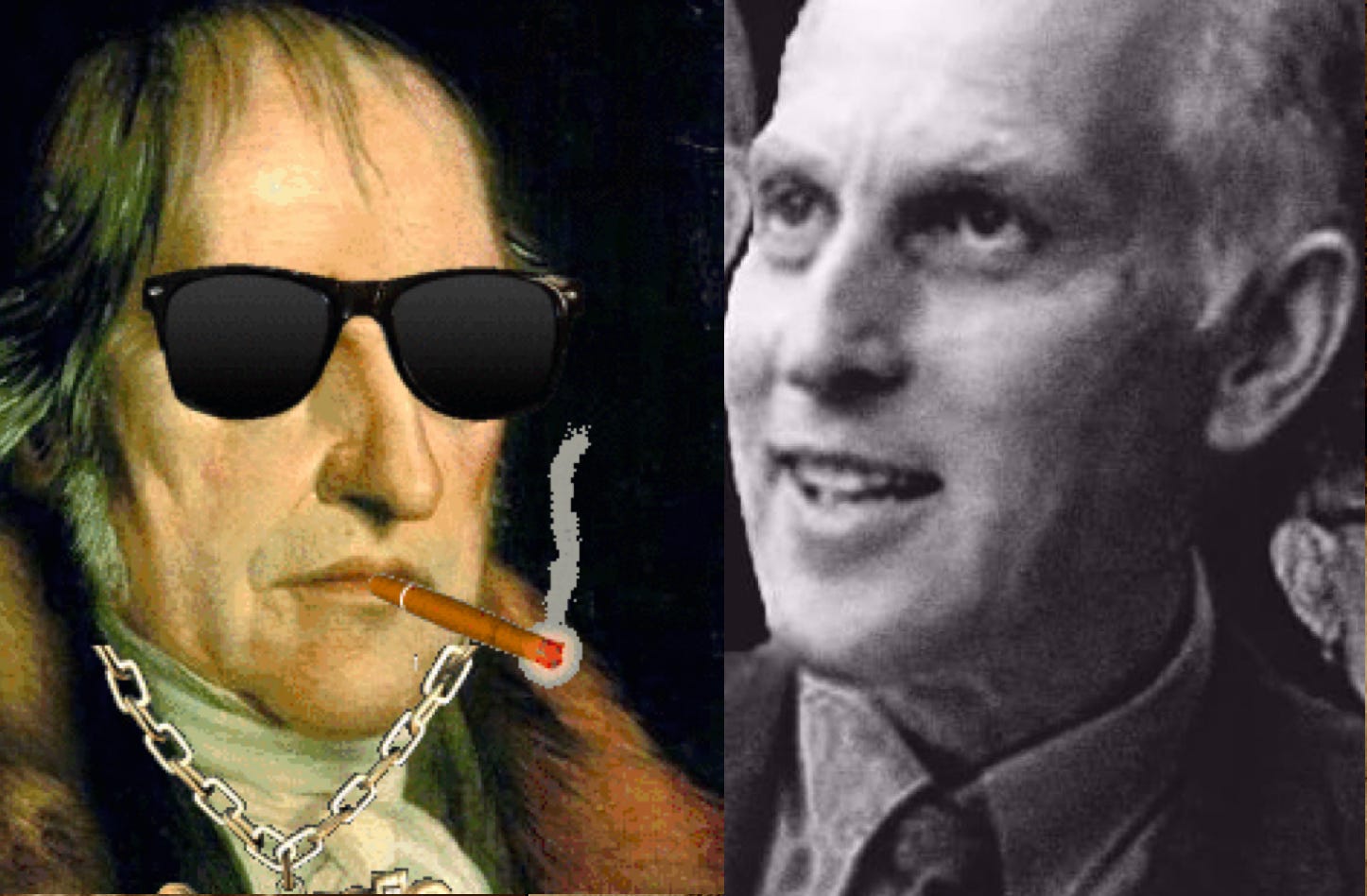
Along with J.G. Fichte and, at least in his early work, F.W.J. von Schelling, Hegel belongs to the period of German idealism in the decades following Kant. The most systematic of the post-Kantian idealists, Hegel attempted, throughout his published writings as well as in his lectures, to elaborate a comprehensive and systematic philosophy from a purportedly logical starting point. He is perhaps most well-known for his teleological account of history, an account that was later taken over by Marx and “inverted” into a materialist theory of an historical development culminating in communism.
3:16: What made you become a philosopher?
Georg Hegel: The impulse of curiosity, the pressure for knowledge, from the lowest level up to the highest rung of philosophical insight arises only from the struggle to cancel this situation of unfreedom and to make the world one's own in one's ideas and thought. After all, we stand at the gates of an important epoch Richard, a time of ferment, when spirit moves forward in a leap, transcends its previous shape and takes on a new one..... A new phase of the spirit is preparing itself. Philosophy especially has to welcome its appearance and acknowledge it, while others, who oppose it impotently, cling to the past. To the philosopher, infinity, knowledge, movement, empirical laws, etc., are things just as familiar as family relations. And as her dead brother and uncle are present to the peasant woman, thus Plato, Spinoza, etc. are present to the philosopher. The one has as much reality as the other, but the latter are immortal.
3:16: But doesn't philosophy always turn up late?
GH: Let's talk about that later. Uneducated people like you Richard delight in argument and fault-finding, for it is easy to find fault, but difficult to recognize the good and its inner necessity. Every consciousness pursues the death of the other. I say philosophy is its own time comprehended in thoughts.
3:16: Why do you go on about history so much?
GH: The only thought which Philosophy brings with it to the contemplation of History, is the simple conception of Reason; that Reason is the Sovereign of the World; that the history of the world, therefore, presents us with a rational process. History in general is therefore the development of Spirit in Time, as Nature is the development of the Idea in Space.
3:16: I guess we should learn from history then?
GH: What experience and history teach us is that neither people nor governments have ever learned anything from history, or acted on principles deduced from history.
3:16: As background, how important are the legacies of early Romanticism – absolute idealism, the wedding of communitarianism and liberalism, the synthesis of Spinoza’s naturalism with Fichte’s idealism - to your own philosophical output?
GH: They're essential. It has been said that the French revolution resulted from philosophy, and it is not without reason that philosophy has been called Weltweisheit [world wisdom]; for it is not only truth in and for itself, as the pure essence of things, but also truth in its living form as exhibited in the affairs of the world. We should not, therefore, contradict the assertion that the revolution received its first impulse from philosophy. Never since the sun had stood in the firmament and the planets revolved around him had it been perceived that man's existence centres in his head, i.e. in thought, inspired by which he builds up the world of reality. Not until now had man advanced to the recognition of the principle that thought ought to govern spiritual reality. This was accordingly a glorious mental dawn. All thinking being shared in the jubilation of this epoch. Emotions of a lofty character stirred men's minds at that time; a spiritual enthusiasm thrilled through the world, as if the reconciliation between the divine and the secular was now first accomplished. Philosophy is the unity of art and religion.
3:16: You think Schelling superior to Fichte but yet you criticize Schelling because you don’t think absolute idealism can be based on an esoteric intuition available only to an intellectual elite?
GH: Too right. By appealing to the feeling, his internal oracle, the intellectual intuitionist is finished with the one who does not agree; he must explain that he has nothing more to say to someone who does not find and feel the same thing in himself; in other words, he kicks Humanity with his feet. To learn the nature of this is to press for the agreement with others, and their existence only in the established commonality of consciousness.
3:16: Are you a metaphysician or a categories theorist, or a social epistemologist, or a neo-Kantian Idealist or a cultural historian, even a proto-hermeneutician?
GH: I’m a Metaphysician! "Metaphysics" is the word, as is "abstract" and almost also "thinking", from which everyone flees more or less like someone attacked by the plague.
3:16: Really? Ok. Sometimes I’m thinking you’re a bit obscure.
GH: It is not the purpose of philosophy to edify. Philosophic is by its nature something esoteric, neither made for the table nor capable of being prepared for the table; it is philosophical only in that it is precisely opposite to understanding ...;
3:16: People oppose the ontological metaphysics of Spinoza, Hamann, Jacobi, Holderlin, Schelling and Schleiermacher to the epistemic metaphysics of Descartes, Fichte and Kant’. Where do you stand? Is your metaphysics ontology or epistemology?
GH: Both. According to my insight everything depends on understanding and expressing the variable not as a substance but just as much as a subject. What is restricted to a natural life can by not going beyond one's divisible existence; but through that another part over is driven out, and this being torn out is his Death. The consciousness, however, is for the concept of being itself, thereby going beyond the limited and, since this is its concern, over itself ... The consciousness thus suffers this power to spoil the limited satisfaction from itself.
3:16: Wow. Ok. Let’s start with your big picture. You’re often said to be reacting to the crisis of the Enlightenment – the realization that the instrument of critisism, Reason itself, had also to be subjected to criticism. Jacobi is a figure who has impressed you with his account of various aspects of this crisis? And by the way, wasn't he in Twin Peaks?
GH: Yes he was. In Jacobi’s attack knowledge is taken to mean knowledge of the finite only, a process of thought from one condition in a series to another, each of which is at once conditioning and conditioned. According to such a view, to explain and to get the notion of anything, is the same as to show it to be derived from something else. Whatever such knowledge embraces, consequently, is partial, dependent, and finite, while the infinite or true, i.e. God, lies outside of the mechanical interconnection to which knowledge is said to be confined.
3:16: Is Jacobi arguing against Kant here, and against any idea of the natural sciences being able to give us objective truths about the absolute nature of the universe?
GH: Yes. It is important to observe that, while Kant makes the finite nature of the Categories consist mainly in the formal circumstance that they are subjective, Jacobi discusses the Categories in their own proper character, and pronounces them to be in their very import finite. What Jacobi chiefly had before his eyes, when he thus described science, was the brilliant successes of the physical or ‘exact’ sciences in ascertaining natural forces and laws. It is certainly not on the finite ground occupied by these sciences that we can expect to meet the in-dwelling presence of the infinite. Lalande was right when he said he had swept the whole heaven with his glass, and seen no God. In the field of physical science, the universal, which is the final result of analysis, is only Matter: and Jacobi well perceived that there was no other issue obtainable in the way of a mere advance from one explanatory clause or law to another.
3:16: So science can’t deliver knowledge of the Absolute?
GH: It doesn't get close. Science cannot unravel all the mysteries of this world. But the world answers in its own way. Science lacks universal intelligibility, and gives the appearance of being the esoteric possession of a few individuals: an esoteric possession, since it is as yet present only in its Notion or in its inwardness; of a few individuals, since its undiffused manifestation makes its existence something singular. Only what is completely determined is at once exoteric, comprehensible, and capable of being learned and appropriated by all. The intelligible form of Science is the way open and equally accessible to everyone, and consciousness as it approaches Science justly demands that it be able to attain to rational knowledge by way of the ordinary understanding; for the understanding is thought, the pure'!' as such; and what is intelligible is what is already familiar and common to Science and the unscientific consciousness alike, the latter through its having afforded direct access to the former.
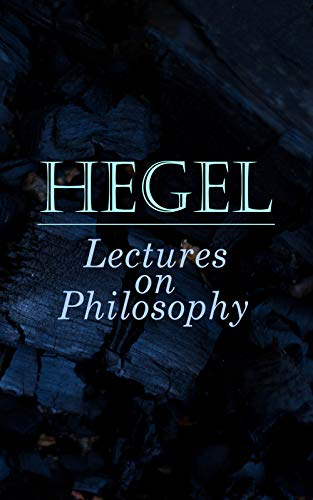
3:16: Nevertheless you defend science don’t you?
GH: Science in its early stages, when it has attained neither completeness of detail nor perfection of form, is vulnerable to criticism. But it would be as unjust for such criticism to strike at the very heart of Science, as it is untenable to refuse to honour the demand for its further development. This polarization seems to be the Gordian knot with which scientific culture is at present struggling, and which it still does not properly understand. One side boasts of its wealth of material and intelligibility, the other side at least scorns this intelligibility, and flaunts its immediate rationality and divinity. Even if the former side is reduced to silence, whether by the force of truth alone or by the blustering of the other, and even in respect of fundamentals, it feels itself outmatched, it is by no means satisfied regarding the said demands ; for they are justified, but not fulfilled. Its silence stems only half from the triumph of its opponent, and half from the boredom and indifference which tend to result from the continual awakening of expectations through unfulfilled promises.
3:16: Was Jacobi basically arguing that the Enlightenment’s Reason was without foundation and literally a matter of faith? Jacobi seems a post-modernist before his time.
GH: Yes. All the while the doctrine that truth exists for the mind was so strongly maintained by Jacobi, that Reason alone is declared to be that by which man lives. This Reason is the knowledge of God. But, seeing that derivative knowledge is restricted to the compass of finite facts, Reason is knowledge underivative, or Faith.
3:16: So is your metaphysics an attempt to answer this crisis of reason that Jacobi and others identified?
GH: Indeed.
3:16: You combine metaphysics with logic don’t you? Why?
GH: Thoughts may be termed Objective Thoughts — among which are also to be included the forms which are more especially discussed in the common logic, where they are usually treated as forms of conscious thought only. Logic therefore coincides with Metaphysics, the science of things set and held in thoughts — thoughts accredited able to express the essential reality of things.
3:16: This sounds like panpsychism or pantheism of some sort – aren’t you making nature full of thought with this approach, a bit like Leibniz or Spinoza?
GH: To speak of thought or objective thought as the heart and soul of the world, may seem to be ascribing consciousness to the things of nature. We feel a certain repugnance against making thought the inward function of things, especially as we speak of thought as marking the divergence of man from nature. It would be necessary, therefore, if we use the term thought at all, to speak of nature as the system of unconscious thought, or, to use Schelling’s expression, a petrified intelligence. And in order to prevent misconception, ‘thought-form’ or ‘thought-type’ should be substituted for the ambiguous term thought.
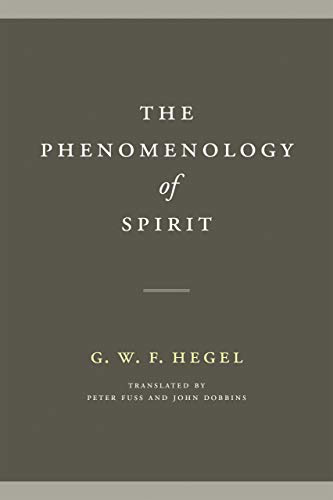
3:16: I thought Kant had banned metaphysics because it wanted to know unconditioned absolute reality and he thought that was impossible?
GH: We may state the first point in Kant’s philosophy as follows: Thought must itself investigate its own capacity of knowledge. People in the present day have got over Kant and his philosophy: everybody wants to get further. But there are two ways of going further — a backward and a forward. The light of criticism soon shows that many of our modern essays in philosophy are mere repetitions of the old metaphysical method, an endless and uncritical thinking in a groove determined by the natural bent of each man’s mind.
3:16: Isn’t the big problem with Kant’s approach that all we can know is our own thoughts? We have epistemology without ontology so to speak. So is your metaphysics your way of getting the ontology – and objectivity - back in and overcoming the radical subjectivity of the Kantian system?
GH: Kant’s examination of the categories suffers from the grave defect of viewing them, not absolutely and for their own sake, but in order to see whether they are subjective or objective. In the language of common life we mean by objective what exists outside of us and reaches us from without by means of sensation. What Kant did was to deny that the categories, such as cause and effect, were, in this sense of the word, objective, or given in sensation, and to maintain on the contrary that they belonged to our own thought itself, to the spontaneity of thought. To that extent therefore they were subjective. And yet in spite of this, Kant gives the name objective to what is thought, to the universal and necessary, while he describes as subjective whatever is merely felt.
3:16: Was he confused?
GH: The charge is unfair if we more narrowly consider the facts of the case. The vulgar believe that the objects of perception which confront them, such as an individual animal, or a single star, are independent and permanent existences, compared with which thoughts are unsubstantial and dependent on something else. In fact however the perceptions of sense are the properly dependent and secondary feature, while the thoughts are really independent and primary. This being so, Kant gave the title objective to the intellectual factor, to the universal and necessary: and he was quite justified in so doing. Our sensations on the other hand are subjective; for sensations lack stability in their own nature, and are no less fleeting and evanescent than thought is permanent and self-subsisting. At the present day, the special line of distinction established by Kant between the subjective and objective is adopted by the phraseology of the educated world.
3:16: But nevertheless, his objectivity really is subjectivity isn’t it?
GH: Objectivity of thought, in Kant’s sense, is to a certain extent subjective. Thoughts, according to Kant, although universal and necessary categories, are only our thoughts — separated by an impassable gulf from the thing, as it exists apart from our knowledge. But the true objectivity of thinking means that the thoughts, far from being merely ours, must at the same time be the real essence of the things, and of whatever is an object to us. But I agree, objective and subjective are convenient expressions in current use, the employment of which may easily lead to confusion.
3:16: Kant is still important to you though?
GH: Kant went beyond this external relation of the understanding as the faculty of concepts and the concept itself to the ego. One of the deepest and most correct insights found in the Critique of Reason is that the unity that defines the essence of the concept is recognized as the originally synthetic unity of apperception, as the unity of "I think" or of self-consciousness.
3:16: You kind of put Aristotle into play with Kant don’t you when you’re talking about purpose?
GH: You’re not quite as stupid as you look Richard. With regard to purpose, one should not immediately or should not merely think of the form in which it is in consciousness, as a determination on hand in the representation. Through the concept of inner purposiveness, Kant re-awakened the idea in general and that of life in particular. Aristotle's determination of life already contains the inner purposiveness and thus stands infinitely far beyond the concept of modern teleology which has only the finite, the external purposiveness in view.
3:16: You sound like you agree with Spinoza that substance is the starting point of all philosophy?
GH: We must first bathe in the aether of Spinoza’s substance before beginning to philosophise.
3:16: In saying we have to discover the Absolute you sound like your philosophy is in the same ballpark as theology and religion. Is that fair?
GH: The objects of philosophy, it is true, are upon the whole the same as those of religion. In both the object is Truth, in that supreme sense in which God and God only is the Truth. Both in like manner go on to treat of the finite worlds of Nature and the human Mind, with their relation to each other and to their truth in God. Some acquaintance with its objects, therefore, philosophy may and even must presume, that and a certain interest in them to boot, were it for no other reason than this: that in point of time the mind makes general images of objects, long before it makes notions of them, and that it is only through these mental images, and by recourse to them, that the thinking mind rises to know and comprehend thinkingly. Philosophy knows God through concepts, religion through feelings – representations. Philosophy puts thoughts and categories but more precisely concepts in the place of representations. But really, there is really only One thinking!
3:16: So philosophy is the thinking study of things?
GH: That description is too wide. If it be correct to say, that thought makes the distinction between man and the lower animals, then everything human is human, for the sole and simple reason that it is due to the operation of thought. Philosophy, on the other hand, is a peculiar mode of thinking — a mode in which thinking becomes knowledge, and knowledge through notions. However great therefore may be the identity and essential unity of the two modes of thought, the philosophic mode gets to be different from the more general thought which acts in all that is human, in all that gives humanity its distinctive character. And this difference connects itself with the fact that the strictly human and thought-induced phenomena of consciousness do not originally appear in the form of a thought, but as a feeling, a perception, or mental image — all of which aspects must be distinguished from the form of thought proper.
3:16: So you don’t see religion conflicting with your affirmation of science or philosophy?
GH: Those who insist on this separation of religion from thinking usually have before their minds the sort of thought that may be styled after-thought. They mean ‘reflective’ thinking, which has to deal with thoughts as thoughts, and brings them into consciousness. Slackness to perceive and keep in view this distinction which philosophy definitely draws in respect of thinking is the source of the crudest objections and reproaches against philosophy. The neglect of this distinction between thought in general and the reflective thought of philosophy has also led to another and more frequent misunderstanding. Reflection of this kind has been often maintained to be the condition, or even the only way, of attaining a consciousness and certitude of the Eternal and True.
The (now somewhat antiquated) metaphysical proofs of God’s existence, for example, have been treated as if a knowledge of them and a conviction of their truth were the only and essential means of producing a belief and conviction that there is a God. Such a doctrine would find its parallel, if we said that eating was impossible before we had acquired a knowledge of the chemical, botanical, and zoological characters of our food; and that we must delay digestion till we had finished the study of anatomy and physiology. Were it so, these sciences in their field, like philosophy in its, would gain greatly in point of utility; in fact, their utility would rise to the height of absolute and universal indispensableness. Or rather, instead of being indispensable, they would not exist at all.
3:16: So your complaint is that we enlightenment rationalists with our science and all aren’t trying to understand the full implications of our situation?
GH: Yes, everyone is confused. The Cartesian philosophy, from unproved postulates, which it assumes to be unprovable, proceeds to wider and wider details of knowledge, and thus gave rise to the sciences of modern times. The modern theory of Jacobi, on the contrary, has come to what is intrinsically a most important conclusion that cognition, proceeding as it must by finite mediations, can know only the finite, and never embody the truth; and would fain have the consciousness of God go no further than the aforesaid very abstract belief that God is. The modern doctrine on the one hand makes no change in the Cartesian method of the usual scientific knowledge, and conducts on the same plan the experimental and finite sciences that have sprung from it.
But, on the other hand, when it comes to the science which has infinity for its scope, it throws aside that method and thus, as it knows no other, it rejects all methods. It abandons itself to wild vagaries of imagination and assertion, to a moral priggishness and sentimental arrogance, or to a reckless dogmatising and lust of argument, which is loudest against philosophy and philosophic doctrines. Philosophy of course tolerates no mere assertions or conceits, and checks the free play of argumentative see-saw.
3:16: So how do you propose to get beyond this? How do we answer the big question: what is reality itself?
GH: The notion of science — the notion therefore with which we start — which, for the very reason that it is initial, implies a separation between the thought which is our object, and the subject philosophising which is, as it were, external to the former, must be grasped and comprehended by the science itself. This is in short, the one single aim, action, and goal of philosophy — to arrive at the notion of its notion, and thus secure its return and its satisfaction.
3:16: You talk about a dialectic movement that consciousness exerts on itself. What is this?
GH: This dialectical movement that consciousness exerts on itself, both in its knowledge and in its object, to the extent that its new and true object arises from it, is properly what we call experience.
3:16: So from this point of view, can this process shed new light on the scientific aspect of experience and consciousness?
GH: Consciousness knows something, this object is the essence or the in-itself; but it is also the in-itself for consciousness; with this arises the ambiguity of this truth. We already see that consciousness now has two objects, one the first in-itself, the other the being for it of this in-itself. The second only seems at first sight the reflection of consciousness in itself, a representation not of an object, but only of its knowledge of the first object. What happens, as has been shown before, is that the first object is altered, ceases to be the in-itself and becomes for consciousness an object that is only the in-itself for it. But with this, the being for her of that in-itself is the true, which means that it is the essence or its object. This new object contains the cancellation of the first, it is the experience made on it.
3:16: Is this how we get to the truth?
GH: Truth is found neither in the thesis nor the antithesis, but in an emergent synthesis which reconciles the two.
3:16: Is this how reasoning humans realise the historical spirit?
GH: Of all forms, the human is the highest and most true, because only in it can the spirit have its corporeality and thus its visual expression.
3:16: So is this your idea of subject-objective identity, your Absolute Idealism?
GH: Absolute Idealism is the doctrine that things are appearences of the universal, divine idea. Everything turns on grasping and expressing the True, not only as Substance, but equally as Subject.
3:16: You sound like Plato.
GH: Nah. Aristotle superseded Plato in speculative depth, since he knew the most solidly grounded speculation or idealism. Aristotle knew that Universals exist only in particular things, are the formal-final causes of things.
3:16: And are these formal-final causes what you call concepts?
GH: Yes.
3:16: Aren’t you committed to a metaphysics that is essentially teleological? Wasn’t teleology – this idea that everything acts for an end - one of the things Kant thought ruled out the possibility of metaphysics and that Spinoza hated too?
GH: I am. It is. To say that there is reason in the world is what is meant by the expression “ objective thought.”
3:16: Is the debate between materialism and idealism misconceived then? You seem to be saying that that the absolute is neither subjective nor objective because the form adheres in both?
GH: To cancel established oppositions is the sole interest of reason. But the interest does not mean that it is opposed to opposition and limitation in general; for necessary opposition is one factor of life, which forms itself by eternally opposing itself, and in the highest liveliness totality is possible only through restoration from the deepest fission.
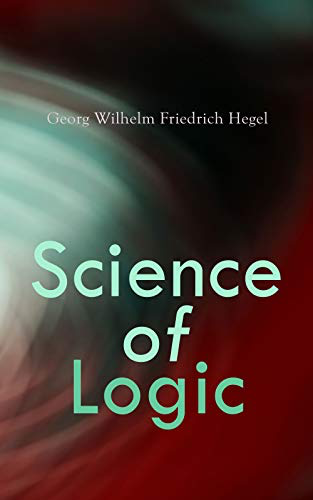
3:16: This seem to be a transformation of Spinoza’s static, ever changeless substance into an ever changing and developing organic thing plus teleology to boot. Kant hated the idea didn’t he, this idea of natural things having a purpose created by the absolute for humankind?
GH: I agree with Schelling when he said Nature should be visible spirit, and spirit should be invisible nature. I used to think of John 1 (1-4) “ In the beginning was the word, and the word was with God… What has come into being in him was life, and the life was the light of the people.’ In my intellectual development, which began from the subordinate needs of human beings, I was driven to science – that is, philosophy – and I had to transform the ideal of my youth into the form of reflection, into a system; I ask myself now how to find my return to intervention in the life of men.
3:16: But what about Kant’s point that we are quite unable to prove that organised natural products cannot be produced through the mechanism of nature?
GH: Well metaphysical questions are inevitable in the natural sciences themselves, but they get concealed.
3:16: Does your absolute idealism commit you to determinism. You seem to think that freedom involves necessity?
GH: That thing is called free that exists from the necessity of its own nature alone and is determined into action by itself alone. I am therefore free in so far as I am identical with the whole universe, I realize this freedom only so far as I become aware of this identity through philosophy.
3:16: Is this what you mean by your concept of reconciliation? You’re a kind of compatibilist aren’t you?
GH: Yes. The self should accept the necessity of the world in so far as he finds his identity in it.
3:16: So do you think that everything happens of necessity for a reason, that you have no place for contingency in your theory – again in this you’re sounding like Spinoza? Aren’t you conflating the realms of essence and existence, as Schelling accused you of doing?
GH: I cannot derive Herr Krug’s pen. But that just shows the limits of philosophy.
3:16: Jean Hyppolite contrasts your Jena philosophy with Schellings in terms of his being a philosophy of life whereas yours is a philosophy of spirit. Is that fair?
GH: That sounds about right. The realm of the spirit is higher than that of nature. Nature externalizes the absolute, the spirit includes both its internalization and its externalization.
3:16: Ok, so how do you justify your metaphysics? Why don’t you go back to Kant and return to epistemic responsibility so philosophy becomes the handmainden of the empirical sciences?
GH: Metaphysics is based on a science of the experience of consciousness. Consciousness knows and conceives nothing more than what is within its consciousness. What is ‘in itself’ must for the philosopher become ‘for itself’. The empirical is not just mere observing, hearing, feeling, perceiving particulars, but it also essentially consists in finding species, universals and laws. Experience is so much more than merely saying here is my lighter and there is my tobacco tin. Consciousness takes a journey of its own dialectic and what it lives through as a result of that dialectic.
3:16: If you base your metaphysics on a critique of knowledge don’t you face the risk of Humean nihilism once more – that all you could have reason to believe in were your own passing impressions?
GH: It is a natural assumption that in philosophy, before we start to deal with its proper viz. the actual cognition of what truly is, one must first of all come to an standing about cognition, which is regarded either as the instrument to get hold of the Absolute, or as the medium through which one discovers it. A certain uneasiness seems justified, partly there are different types of cognition, and one of them might be more appropriate than another for the attainment of this goal, so that we could make a bad choice of means ; and partly because cognition is a faculty of a definite kind and scope, and thus, without a more precise definition of its nature and limits, we might grasp clouds of error instead of the heaven of truth.
This feeling of uneasiness is surely bound to be transformed into the conviction that the whole project of securing for consciousness through cognition what exists in itself is absurd, and that there is a boundary between cognition and the Absolute that completely separates them. For, if cognition is the instrument for getting hold of absolute being, it is obvious that the use of an instrument on a thing certainly does not let it be what it is for itself, but rather sets out to reshape and a1ter it. If, on the other hand, cognition is not an instrument of our activity but a more or less passive medium through which the light of truth reaches us, then again we do not receive the truth as it is in itself, but only as it exists through and in this medium. Either way we employ a means which immediately brings about the opposite of its own end; or rather, what is really absurd is that we should make use of a means at all.
3:16: Ok, so that’s the problem. How does your notion of self-knowledge and Geist – spirit – solve the problem?
GH: The simple substance of Life is the splitting-up of itself into shapes and at the same time the dissolution of these existent differences; and the dissolution of the splitting-up is just as much a splitting-up and a forming of members. Withthis, the two sides of the whole movement which before were distinguished viz. the passive separatedness of the shapes in the general medium of independence, and the process of Life, collapse into one another. The latter is just as much an imparting of shape as a supersession of it; and the other, the imparting of shape, is just as much a supresession as an articulation of shape.
3:16: So intersubjectivity is a foundational thing. Are you socializing Kant ?
GH: Yes. As I put it: With this, we already have before us the Notion of Spirit. What still lies ahead for consciousness is the experience of what Spirit is - this absolute substance which is the unity of the different independent self-consciousnesses which} in their opposition, enjoy perfect freedom and independence: 'I that is 'We' and 'We' that is 'I'. It is in self-consciousness, in the Notion of Spirit, that consciousness first finds its turning-point, where it leaves behind it the colourful show of the sensuous here-and-now and the nightlike void of the supersensible beyond, and steps out into the spiritual daylight of the present.
3:16: But how is it possible? How can you explain ordinary experience in terms of self-knowledge?
GH: The ego’s constant goal is absolute independence. It goes through stages. The first is Desire. In the sphere of Life, which is the object of Desire, negation is present either in an other, viz in Desire, or as a determinateness opposed to another indifferent form, or as the inorganic universal nature of Life. But this universal independent nature in which negation is present as absolute negation, is the genus as such, or the genus as self-consciousness. Self-consciousness achieves its satisfaction only in another self-consciousness.
3:16: What’s Recognition? Is it about the need to recognize other rational beings alongside yourself?
GH: Yes. Self-consciousness exists in and for itself when, and by the fact that, it so exists for another; that is, it exists only in being acknowledged. The Notion of this Unity in its duplication embraces many and varied meanings. The detailed exposition of the Notion of this spiritual unity in its duplication will present us with the process of Recognition. The other is equally independent and self-contained, and there is nothing in it of which it is not itself the origin. The first does not have the object before it merely as it exists primarily for desire, but as something that has an independent existence of its own, which, therefore, it cannot utilize for its own purposes, if that object does not of its own accord do what the first does to it.
Thus the movement is simply the double movement of the two self-consciousnesses. They are, for each other, shapes of consciousness which have not yet accomplished the movement of absolute abstraction, of rooting-out all immediate being, and of being merely the purely negative being of self- identical consciousness; in other words, they have not as yet exposed themselves to each other in the form of pure being- for-self, or as sellf-consciousnesses. Each is indeed certain of its own self, but not of the other, and therefore its own self-certainty still has no truth. For it would have truth only if its own being-for self had confronted it as an independent object, or, what is the same thing, if the object had presented itself as this pure self-certainty. But according to the Notion of recognition this is possible only when each is for the other what the other is for it, only when each in its own self through its own action, and again through the action of the other, achieves this pure abstraction of being-for-self.
3:16: You suggest that for the self to gain the recognition of the other it must engage in a life and death struggle with them don’t you. So this is the next stage isn't it? Why has it got to be to so violent – why can't they just sit down and chat about it?
GH: They must engage in this struggle, for they must raise their certainty of being for themselves to truth, both in the case of the other and in their own case. And it is only through staking one's life that freedom is won; only thus is it proved that for self- consciousness, its essential being is not [just] being, not the immediate form in which it appears, not its submergence ill the expanse of life, but rather that there is nothing present in it which could not be regarded as a vanishing ,moment, that it is only pure being-for-self. The individual who has not risked his life may well be recognized as a person, but he has not attained to the truth of this recognition as an independent self- consciousness. Similarly, just as each stakes his own life, so each must seek the other's death, for it values the other no more than itself; its essential being is present to it in the form of an 'other', it is outside of itself and must rid itself of its self-externality.
3:16: But this struggle mustn’t actually end in death can it? After all, if it kills its opponent the self won’t have anyone to recognize it will it?
GH: Exactly so. This trial by death does away with the truth which was supposed to issue from it, and so, too, with the certainty of self generally. For just as life is the natural setting of consciousness, independence without absolute negativity, so death is the natural negation of consciousness, negation without independence, which thus remains without the required significance of recognition. Death certainly shows that each staked his life and held it of no account, both in himself and in the other; but that isn’t for those who survived this struggle.
They put an end to their consciousness in its alien setting of natural existence, that is to say, they put an end to themselves, and are done away with as extremes wanting to be for themselves, or to have an existence of their own. But with this there vanishes from their interplay the essential moment of splitting into extremes with opposite characteristics; and the middle term collapses into a lifeless unity which is split into -lifeless, merely immediate, unopposed extremes; and the two do not reciprocally give and receive one another back from each other consciously, but leave each other free only indifferently, like things.
3:16: So if the self has beaten its foe but can’t kill it then what? Again, I don’t see why they couldn’t just settle down and talk it through over a few beers?
GH: They are unequal and opposed, and their reflection into a unity has not yet been achieved, they exist as two opposed shapes of consciousness; one is the independent consciousness whose essential nature is to be for itself, the other is the dependent consciousness whose essential nature is simply to live or to be for another. The former is master, the other is slave. The master is the consciousness that exists for itself, but no longer merely the Notion of such a consciousness. Rather, it is a consciousness existing for itself which is mediated with itself through another consciousness, i.e. through a consciousness whose nature it is to be bound up with an existence that is independent, or thing hood in general. The master relates himself mediately to the slave through a being [a thing] that is independent, for it is just this which holds the slave in bondage; it is his chain from which he could not break free in the struggle, thus proving himself to be dependent, to possess his independence in thing hood. But the master is the power over this thing, for he proved in the struggle that it is something merely negative; since he is the power over this thing and this again is the power over the other [the slave], it follows that he holds the other in subjection.
3:16: So is recognition in the proper sense possible in this unequal situation?
GH: No. For recognition proper the moment is lacking, that what the master does to the other he also does to himself, and what the slave does to himself he should also do to the other. The outcome is a recognition that is one-sided and unequal. What now really confronts the master is not an independent consciousness, but a dependent one. He is, therefore, not certain of being-for-self as the truth of himself. On the contrary, his truth is in reality the unessential consciousness and its unessential action. And just as lordship showed that its essential nature is the reverse of what it wants to be, so too servitude in its consummation will really turn into the opposite of what it immediately is; as a consciousness forced back into itself, it will withdraw into itself and be transformed into a truly independent consciousness. Through work, however, the slave becomes conscious of what he truly is. Desire has reserved to itself the pure negating of the object and thereby its unalloyed feeling of self. But that is the reason whythis satisfaction is itself only a fleeting one, for it lacks the side of objectivity and permanence. Work, on the other hand, is desire held in check, fleetingness staved off; in other words, work forms and shapes the thing. The slave realizes that it is precisely in his work wherein he seemed to have only an alienated existence that he acquires a mind of his own.
3:16: So we’re getting somewhere?
GH: We are in the presence of self- consciousness in a new shape, a consciousness which, as the infinitude of consciousness or as its own pure movement, is aware of itself as essential being, a being which thinks or is a free self- consciousness. For to think does not mean to be an abstract 'I',but an 'I' which has at the same time the significance of intrinsic being, of having itself for object, or of relating it self to objective being in such a way that its significance is the being-for-self of the consciousness for which it is [an object]. For in thinking, the object does not present itself in picture-thoughts but in Notions, i.e. in a distinct being-in-itself for intrinsic being, consciousness being immediately aware that this is not anything distinct from itself.
3:16: Is this Stoicism?
GH: The selfsame consciousness that repels itself from itself becomes aware of itself as the element of but at first it knows itself to be this element only as a universal mode of being in general, not as it exists objectively in the development and process of its manifold being.
This freedom of self-consciousness when it appeared as a conscious manifestation in the history of Spirit has, as we know, been called Stoicism. Its principle is that consciousness is a being that thinks, and that consciousness holds something to be essentially important, or true and good only in so far as it thinks it to be such. Consciousness has a negative attitude towards the master and slave relationship. As master, it does not have its truth in the slave, nor as slave is its truth in the master's will and in his service.
Self-will is the freedom which entrenches itself in some particularity and is still in slavery, while Stoicism is the freedom which always comes directly out of slavery and returns into the pure universality of thought. As a universal form of the World Spirit Stoicism could only appear on the scene in a time of universal fear and bondage but also a time of universal culture which had raised itself to the level ofthought. To the question, What is good and true, it again gave for answer the contentless thought: The True and the Good shall consist in reasonableness. But this self-identity of thought is again only the pure form in which nothing is determined. The True and the Good, wisdom and virtue, the general terms beyond which Stoicism cannot get, are therefore in a general way no doubt uplifting, but since they cannot in fact produce any expansion of the content, they soon become tedious.
3:16: So Stoicism, like Christianity and the French Revolution fail because they only get so far as to reject the world. They can't go far enough. What’s the role of skepticism here?
GH: In Stoicism, self-consciousness is the simple freedom of itself. In Skepticism, this freedom becomes a reality, negates the other side of determinate existence, but really duplicates itself, and now knows itself to be a duality. Consequently, the duplication which formerly was divided between two individuals, the master and the slave, is now lodged in one. The duplication of self-consciousness within itself, which is essential in the Notion of Spirit, is thus here before us, but not yet in its unity: the Unhappy Consciousness is the consciousness of self as a dual-natured, merely contradictory being. The Unhappy Consciousness itself is the gazing of one self-consciousness into another, and itself is both, and the unity of both is also its essential nature. But it is not as yet explicitly aware that this is its essential nature, or that it is the unity of both.
3:16: I take it that the master slave relationship must collapse and then the slave be liberated for happy consciousness to arrive? Is your argument here Rousseauesque?
GH: Insofar as I endorse endorse Rousseau’s lines : He who believes himself a master of others is more a slave than they.
3:16: So through this process the self recognizes there is something beyond his own consciousness – the existence of another rational conscious being beyond her control – and by so doing the threatened Human/Kantian nihilism and solipsism are overcome.
GH: Damn right they are. Pretty good eh?
3:16: Well, it’s more a moral than a metaphysical refutation of nihilism isn’t it? After all, the other might be a robot?
GH: Bah.
3:16: So you aren’t against Kant’s Copernican revolution are you? You see yourself as completing it?
GH: Exactly. The aim of philosophy is to know the absolute, or construct it for consciousness.
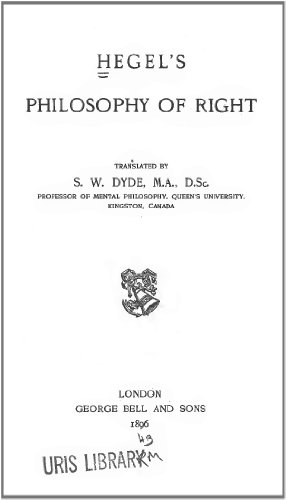
3:16: Well, let’s turn from your metaphysics to your social and political philosophy. Actually, you think the metaphysics underpins your political and social stuff don’t you, and to look at it without this underpinning would be a kind of positivism, which you hate?
GH: Yep. It may readily be observed that the work as a whole, and also the construction of the parts, rest upon the logical spirit. From this standpoint, especially I would like this treatise to be understood and judged. In such a work as this we are dealing with a science, and in a science the matter must not be separated from the form.
3:16: Freedom is really important to you isn’t it? What is freedom for you in the context of your social and political thinking?
GH: Three things. Firstly, Autonomy - Only that will that obeys the law is free, for it obeys itself and is self-sufficient. Secondly, Independence: spirit is a self-sufficient being and just this is freedom. For if I am dependent I relate to something that is not I and I cannot be without this external thing. The will is free is it relates to nothing but itself, so that every relationship of dependence on something other than itself falls away. And thirdly, Self-determination.
3:16: Is an ideal politics one of rule from below, by the people in a spirit of friendship and common associations and feelings?
GH: That idea is the last degree of shallowness, because in it science is looked upon as developing, not out of thought or conception, but out of direct perception and random fancy. Now the organic connection of the manifold branches of the social system is the architectonic of the state’s rationality, and in this supreme science of state architecture the strength of the whole is made to depend upon the harmony of all the clearly marked phases of public life, and the stability of every pillar, arch, and buttress of the social edifice. And yet the shallow doctrine, of which we have spoken, permits this elaborate structure to melt and lose itself in the brew and stew of the “heart, friendship, and inspiration.”
Epicurus, it is said, believed that the world generally should be given over to each individual’s opinions and whims; and according to the view we are criticising the ethical fabric should be treated in the same way. By this old wives’ concoction, which consists in founding upon the feelings what has been for many centuries the labour of reason and understanding, we no longer need the guidance of any ruling conception of thought. On this point Goethe’s Mephistopheles, and the poet is a good authority, has a remark, which I have already used elsewhere—
“Only despise understanding and science,
the highest gifts of man
So you surrendered to the devil
and must perish.”
It is no surprise that the view just criticised should appear in the form of piety. Where, indeed, has this whirlwind of impulse not sought to justify itself? In godliness and the Bible it has imagined itself able to find authority for despising order and law.
3:16: Is Plato and his Republic important to you?
GH: Plato knew that there was breaking in upon Greek life a deeper principle, which could directly manifest itself only as an unsatisfied longing and therefore as ruin. Moved by the same longing Plato had to seek help against it but had to conceive of the help as coming down from above and hoped at last to have found it in an external special form of Greek ethical observance. He exhausted himself in contriving how by means of this new society to stem the tide of ruin, but succeeded only in injuring more fatally its deeper motive, the free infinite personality. Yet he has proved himself to be a great mind because the very principle and central distinguishing feature of his idea is the pivot upon which the world-wide revolution then in process turned:What is rational is real; And what is real is rational.
Upon this conviction stand not philosophy only but even every unsophisticated consciousness. From it also proceeds the view now under contemplation that the spiritual universe is the natural. When reflection, feeling, or whatever other form the subjective consciousness may assume, regards the present as vanity, and thinks itself to be beyond it and wiser, it finds itself in emptiness, and, as it has actuality only in the present, it is vanity throughout. Against the doctrine that the idea is a mere idea, figment or opinion, philosophy preserves the more profound view that nothing is real except the idea.
3:16: You’re trying to teach the world what it ought to be via philosophy, but like I said earlier, isn’t philosophy always too late according to you?
GH: Haha. Yes. For such a purpose philosophy at least always comes too late. Philosophy, as the thought of the world, does not appear until reality has completed its formative process, and made itself ready. History thus corroborates the teaching of the conception that only in the maturity of reality does the ideal appear as counterpart to the real, apprehends the real world in its substance, and shapes it into an intellectual kingdom. When philosophy paints its grey in grey, one form of life has become old, and by means of grey it cannot be rejuvenated, but only known. The owl of Minerva takes its flight only when the shades of night are gathering. Philosophy forms a circle. Philosophy is a consequence, which does not hang in the air or form a directly new beginning, but is self- enclosed.
3:16: When you say freedom is realised only within the realm of nature you're disagreeing with Kant's dualistic account of self-determination aren't you?
GH: Too right I am. The body is the same life as the soul, and yet the two can be named independently. A soul without a body would not be a living thing, and vice versa. Seeds contain the tree and its whole power, though they are not the tree itself; the tree corresponds accurately to the simple structure of the seed. If the body does not correspond to the soul, it is defective. The unity of visible existence and conception, of body and soul, is the idea. It is not a mere harmony of the two, but their complete interpenetration.
3:16: Is Montesquieu important to your conception of history and philosophy?
GH: Sure. He's a groove sensation. With regard to the historical element in positive right it may be said that the true historical view and genuine philosophic standpoint have been presented by Montesquieu. He regards legislation and its specific traits not in an isolated and abstract way, but rather as a dependent element of one totality, connecting it with all the other elements which form the character of a nation and an epoch. In this interrelation the various elements receive their meaning and justification.
3:16: Some of your critics have accused you of betraying freedom and liberty – of pushing a positive freedom position which sanctions Rousseau’s notion of ‘forcing a person to be free.’ Does your view of rights justify authoritarian, dictatorial politics?
GH: Of course not. I regard the principle of the right to subjectivity or the right of subjective freedom to be inescapable and always have. It is the right to recognize nothing that I do not perceive as rational. Whatever the subjective will is to recognize as valid should be perceived by it as good. It is the right of the subject to find its satisfaction in its action. The will can recognize something or be something only in so far as that thing is its own. For a content to be accepted and held to be true , man must find himself actively involved with it, more preceisely, he must find any such content to be at one and in unity with the certainty of his won self.
In a state which is really articulated rationally all the laws and organizations are nothing but a realization of freedom in its essential characteristics. When this is the case, the individual’s reason finds in these institutions, only the actuality of his own essence, and if he obeys these laws, he coincides, not with something alien to himself, but simply with what is his own. Freedom of choice, of course, is often equally called ‘freedom’; but freedom of choice is only non-rational freedom, choice and self-determination issuing not from the rationality of the will but from fortuitous impulses and their dependence on sense and the external world.
3:16: So are you a liberal at heart?
GH: Let's not get giddy Richard. Of course I believe that a human being counts as such because he is a human being, not because he is a Jew, Catholic, Protestant, German, Italian etc. This consciousness , which is the aim of thought, is of infinite importance. But I dislike the classic liberal economic model, the limited purpose of a liberal state to protect natural rights and the market, its social contract theory and its purely negative theory of liberty.
3:16: What’s the role of the ethical life in your system?
GH: It’s central. In an ethical community it is easy to say what someone must do and what his duties are which he has to fulfill in order to be virtuous. He must simply do what is prescribed, expressly stated, and known to him in the situation.
3:16: Doesn’t that mean we should just do what our community tells us to do and accepts? How can we criticize our communities?
GH: Well, the right of the rational – as the objective – over the subject remains firmly established.
3:16: Sounds a bit authoritarian to me Georg.
GH: The subjective will has worth and dignity in so far as its insight and intention are in conformity with the good. Since the good is the particular will’s substance it has an absolute right as distinct from the abstract right of property and the particular ends of welfare.
3:16: You’re not making it sound any better.
GH: One of the commonest errors of abstraction to insist on private rights and private welfare as valid in and for themselves in opposition to the universaility of the state.
3:16: So how do you answer Locke’s question: “ Who shall judge?”
GH: The government - certainly not the people.
3:16: What do you mean when you talk of the organic state?
GH: A state must possess unity in difference.
3:16: Is this your way of saying you need a civic government in a state – the existence of independent groups within the state - something which continental Europe lost but which remained in play in England since mediaeval times as we see when we read Toqueville, Maitland and Durkheim?
GH: Yep. Breaking with our medieval past was one of the silliest of notions. But let’s face it, civil society is the stage of the alienation of ethical life.
3:16: Yet you place great value on civil society don’t you? Is this where you part company with Rousseau? Don’t you think that civil society destroys freedom, for example?
GH: Individuals in the civic community are private persons, who pursue their own interests. As these interests are occasioned by the universal, which appears as a means, they can be obtained only in so far as individuals in their desire, will, and conduct, conform to the universal, and become a link in the chain of the whole. The interest of the idea as such does not, it is true, lie in the consciousness of the citizens; yet it is not wholly wanting. It is found in the process, by means of which the individual, through necessity of nature and the caprice of his wants, seeks to raise his individual natural existence into formal freedom and the formal universality of knowing and willing. Thus, without departing from its particular nature, the individual’s character is enlarged.
3:16: What about the inequality of civil society that Rousseau criticized?
GH: Nature is the element of inequality. Yet the objective right of particularity of spirit, contained in the idea itself, does not in the civic community supersede the inequality set up by nature. On the contrary, it produces inequality out of spirit and exalts it to an inequality of talents, wealth, and intellectual and moral education. To oppose to the objective right a demand for equality is a move of the empty understanding, which takes its own abstraction and mandate to be real and reasonable.
3:16: But you don’t like extreme inequality because it produces rabbles don’t you?
GH: The rabble loses that feeling of right, integrity and honour that comes from supporting oneself by one’s own activity.
3:16: Do you think work in the civil society is alienating. Should the state intervene?
GH: Yes. Civil society is a wild beast that needs a constant and strict taming and mastery.
3:16: But I like being free to choose my obligations. I want to be free.
GH: An ignorant man like you Richard is not free, because what confronts him is an alien world, something outside him and in the offing, on which he depends, without his having made this foreign world for himself and therefore without being at home in it by himself as in something his own. The impulse of curiosity, the pressure for knowledge, from the lowest level up to the highest rung of philosophical insight arises only from the struggle to cancel this situation of unfreedom and to make the world one's own in one's ideas and thought. Also, when liberty is mentioned, we must always be careful to observe whether it is not really the assertion of private interests which is thereby designated.
3:16: I try and have ideas.
GH: Richard, an idea is always a generalization, and generalization is a property of thinking. To generalize means to think. People like you, people who are too fastidious towards the finite, never reach actuality, but linger in abstraction, and their light dies away.
3:16: What about freedom of speech, freedom of the press?
GH: The definition of the freedom of the press as freedom to say and write what one pleases, is parallel to the one of freedom in general, viz., as freedom to do what one pleases. Such a view belongs to the uneducated crudity and superficiality of naïve thinking.
3:16: What about Rousseau’s notion of 'the people'?
GH: The many ... whom one chooses to call the people, are a multitude, a formless mass, whose movement and action would be elemental, irrational, savage, and terrible.
3:16: You defend constitutional monarchy. Doesn’t that make you a reactionary conservative?
GH: No, that would require me to support absolute monarchy. Constitutional monarchy is a synthesis of monarchy, aristocracy and democracy. I like Montesquieu’s notion of the division of powers because understood in its true sense it could rightly be regarded as the guarantee of public freedom. I assign monarchy only a formal role, serving the highest instance of formal decision.
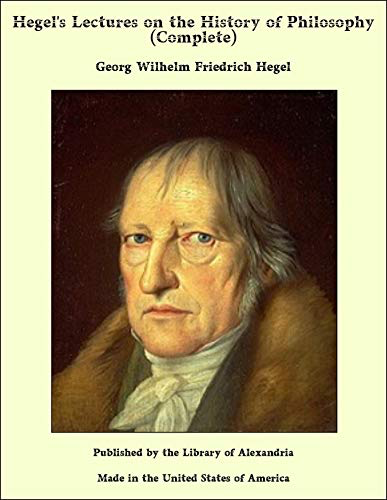
3:16: You’re often thought of as the philosopher of historicism. What is this?
GH: It follows from my Absolute Idealism. Reason governs the world and that world history is therefore a rational process. We must not rest with a necessity that originates in causes that are themselves no more than external circumstances. The first thing that we must observe is this: that what we have called a principle , final end, or vocation, or what is spirit in itself, its nature or concept – is only something universal or abstract. A principle , so too a fundamental proposition or law, is something universal or inner that as such, however true in itself, is still not completely actualized. For its actuality another moment has to be added, and this is enactment, actualization, whose principle is the will, the activity of men in the world. It is only through this activity that those concepts, implicit determinations, are actualized. The national spirit is a natural individual; as such it blossoms, grows strong, fades away and dies. History’s development is dialectical.
3:16: What do you mean by the cunning of reason?
GH: Reason uses the self-interest of individuals to realize its ends.
3:16: That sounds a bit Machiavellian. Is there no room for pursuing goodness for its own sake.
GH: Get real Richard. There is no room in living reality for empty notions like that. For world history works on a higher plane than that to which morality properly belongs, which is that of private convictions, the conscience of individuals, and their own peculiar will and mode of action. What is required and achieved by the ultimate purpose of spirit, what is done by providence, lies above the obligations, liability and responsibility which fall to individualty with respect to its ethical life.
3:16: Passion plays a role as well as reason doesn’t it?
GH: The natural force of passion has a more immediate hold over man than that artificial and laboriously acquired discipline of order and moderation, justice and morality. Nothing great in the world has been accomplished without passion. Actually, passion is not quite the right word for what I am trying to express. I use it here to denote any human activity that is governed by particular interests, special aims or, if you will, by selfish motivations.
3:16: You allow that world historical individuals have some degree of moral idealism in the realization of history don’t you, people like Napoleon, for example?
GH: What they want is the universal. That is their pathos. Great men want to satisfy themselves, not the well-meaning intentions of others. Napoleon? I saw the Emperor—this world-soul —riding out of the city on reconnaissance. It is indeed a wonderful sensation to see such an individual, who, concentrated here at a single point, astride a horse, reaches out over the world and masters it.
3:16: They sound like monsters.
GH: They must trample many an innocent flower underfoot and destroy much that lies in its path. Public opinion contains all kinds of falsity and truth, but it takes a great man to find the truth in it. The great man of the age is the one who can put into words the will of his age, tell his age what its will is, and accomplish it. What he does is the heart and the essence of his age, he actualizes his age. The man who lacks sense enough to despise public opinion expressed in gossip will never do anything great.
3:16: I say make peace not war but you don't do you?
GH: War is progress, peace is stagnation. Propounding peace and love without practical or institutional engagement is delusion, not virtue Richard. Grow up. You're not John Lennon.
3:16: So the process towards freedom is destructive?
GH: Of course. Universal liberty can’t produce any work or any positive action, only negative action. Universal liberty is only the rush to erase. The sole work and deed of universal freedom is therefore death, a death too which has no inner significance or filling, for what is negated is the empty point of the absolutely free self. It is thus the coldest and meanest of all deaths, with no more significance than cutting off a head of cabbage or swallowing a mouthful of water.
3:16: If everything is happening according to a divine plan, how come there’s evil?
GH: Ah yes, to whom, to what ultimate end have these monstrous sacrifices been made? History is indeed a slaughter bench. Good and evil are two sides of the same development. Evil is necessary.
3:16: That's dark.
GH: Stop being a wuss. The theological doctrine of original sin is a profound truth; but our modern enlightenment prefers to believe that man is naturally good, and that he acts right so long as he continues true to nature. The hour when man leaves the path of mere natural being marks the difference between him, a self-conscious agent, and the natural world. But this schism, though it forms a necessary element in the very notion of spirit, is not the final goal of man. It is to this state of inward breach that the whole finite action of thought and will belongs. In that finite sphere man pursues ends of his own and draws from himself the material of his conduct. While he pursues these aims to the uttermost, while his knowledge and his will seek himself, his own narrow self apart from the universal, he is evil; and his evil is to be subjective.
3:16: Can we get rid of this evil?
GH: Well, we seem at first to have a double evil here: but both are really the same. Man in so far as he is spirit is not the creature of nature: and when he behaves as such, and follows the cravings of appetite, he wills to be so. The natural wickedness of man is therefore unlike the natural life of animals. A mere natural life may be more exactly defined by saying that the natural man as such is an individual: for nature in every part is in the bonds of individualism. Thus when man wills to be a creature of nature, he wills in the same degree to be an individual simply. Yet against such impulsive and appetitive action, due to the individualism of nature, there also steps in the law or general principle. This law may either be an external force, or have the form of divine authority. So long as he continues in his natural state, man is in bondage to the law. It is true that among the instincts and affections of man, there are social or benevolent inclinations, love, sympathy, and others, reaching beyond his selfish isolation. But so long as these tendencies are instinctive, their virtual universality of scope and purport is vitiated by the subjective form which always allows free play to self-seeking and random action.
3:16: Wow. What’s the meaning of life then?
GH: Well, the province of the spirit is created by man himself; and whatever ideas we may form of the kingdom of God, it must always remain a spirit kingdom that is realized in man and that man is expected to translate into actuality. Man owes his entire existence to the state and has his being within it alone. Whatever worth and spiritual reality he possesses are his solely by virtue of the state. The worth of individuals is measured by the extent to which they reflect and represent the national spirit and have adopted a particular station within the affairs of the state as a whole.
3:16: Xi Jinping would love you. Kierkegaard and Nietzsche don’t like your historicism on the grounds that it undermined the value of individuality. From where I’m sitting I tend to feel they have a point .
GH: Well, Reason can’t stop to consider the injuries sustained by single individuals, for particular ends are submerged in the universal end. Individuals fade into insignificance beside the universal substance. But then again even the religion and morals of a restricted sphere of life have an infinite worth apart from their role in history. There is an inner centre, the personal source of morality and religion that remains untouched and protected from the noisy clamour of world history. But as Aristotle said, apart from the polis, man is either a beast or God. Zarathrustra’s companions, after all, were a serpent and an eagle.
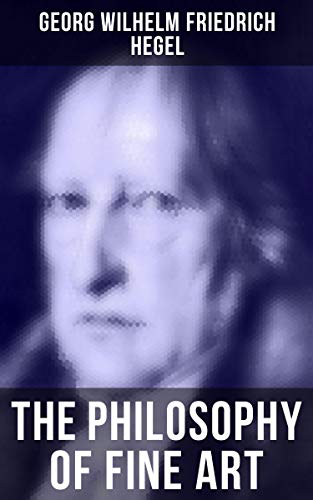
3:16: Finally, turning to your aesthetics, you seem to see the arts as doomed and as worthless, or at least, diminishing in value. You write a lot about the arts but seem to do so only to disparage them, saying they’re not as important as religion and philosophy. What’s going on?
GH: The age of art is classical Greece, the age of religion the Middle Ages, and the age of philosophy modernity. So first Universality, then particularity and now Individuality. Art no longer addresses our highest needs. It has been surpassed by philosophy.
3:16: Is art finished then?
GH: If we are in a general way permitted to regard human activity in the realm of the beautiful as a liberation of the soul, as a release from constraint and restriction, in short to consider that art does actually alleviate the most overpowering and tragic catastrophes by means of the creations it offers to our contemplation and enjoyment, it is the art of music which conducts us to the final summit of that ascent to freedom. Beauty and art, no doubt, pervade all business of life like a kindly genius, and form the bright adornment of all our surroundings, both mental and material, soothing the sadness of our condition and the embarrassments of real life, killing time in entertaining fashion, and where there’s nothing to be achieved, occupying the place of what is vicious, better, at any rate, than vice.
3:16: Is only Greek art beautiful then?
GH: There can be nothing more beautiful than the classical; there is the ideal but we may well hope that art will always rise higher and come to perfection.
3:16: Is music the best art?
GH: If we are in a general way permitted to regard human activity in the realm of the beautiful as a liberation of the soul, as a release from constraint and restriction, in short to consider that art does actually alleviate the most overpowering and tragic catastrophes by means of the creations it offers to our contemplation and enjoyment, it is the art of music which conducts us to the final summit of that ascent to freedom.
3:16: Who are your favourite musicians then?
GH: My ideal music is the music of Palestrina, Gluck, Haydn and Mozart: even in the deepest grief tranquillity of soul is never missing ; grief is expressed there, too, but it is assuaged at once; everything is kept firmly together in a restrained form so that jubilation does not degenerate into a repulsive uproar, and even a lament gives us the most blissful tranquility.
3:16: So can modern art have significance beyond individual self expression.
GH: Depends. Art should not contradict the formal law of being simply beautiful and capable of artistic treatment. Nothing that can be living in the human breast is alien to that spirit. Modern art may represent everything in which the human being as such is capable of being at home.
3:16: And for the readers here at 3:16, can you recommend five books that will take us further into your philosophical world?
GH: Sure: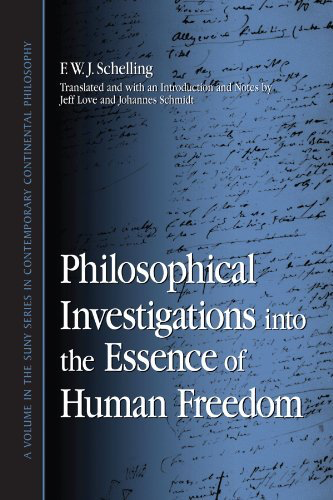
Schelling's Philosophical Investigations.
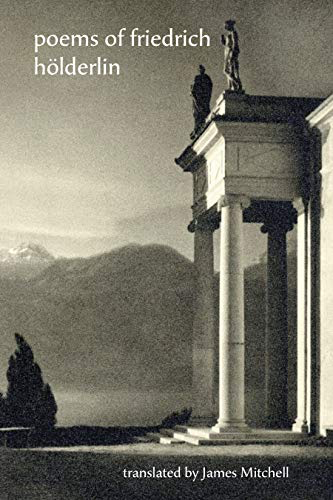
Poems of Holderlin.

Fichte's Addresses to the German Nation
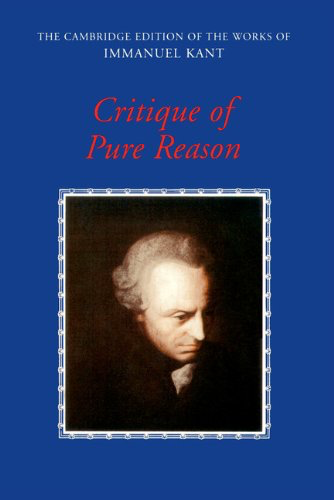
Kant's Critique of Pure Reason
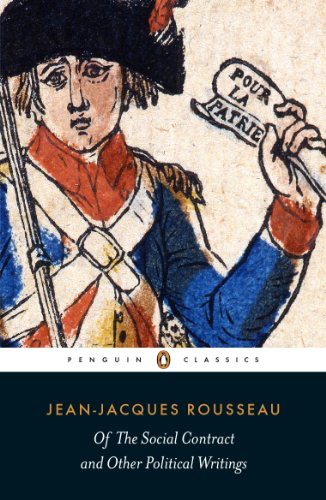
Jean-Jacques Rousseau On the Social Contract
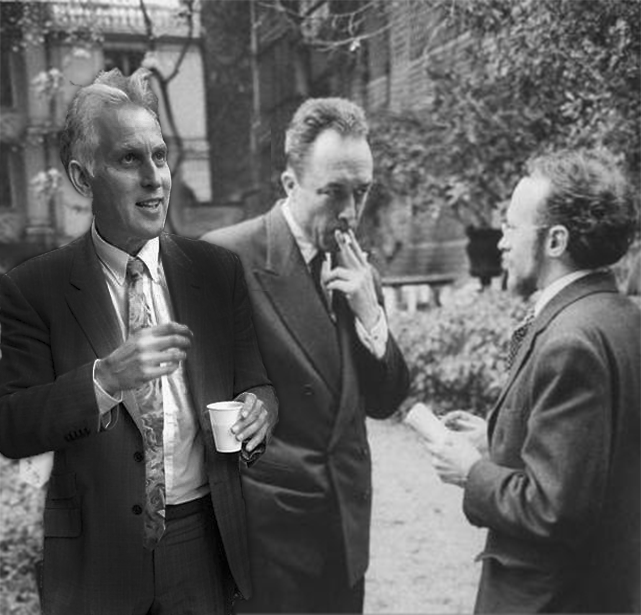
ABOUT THE INTERVIEWER
Richard Marshall is biding his time
Previous: 3:16 interviews in the series with Schopenhauer, Nietzsche and Debord